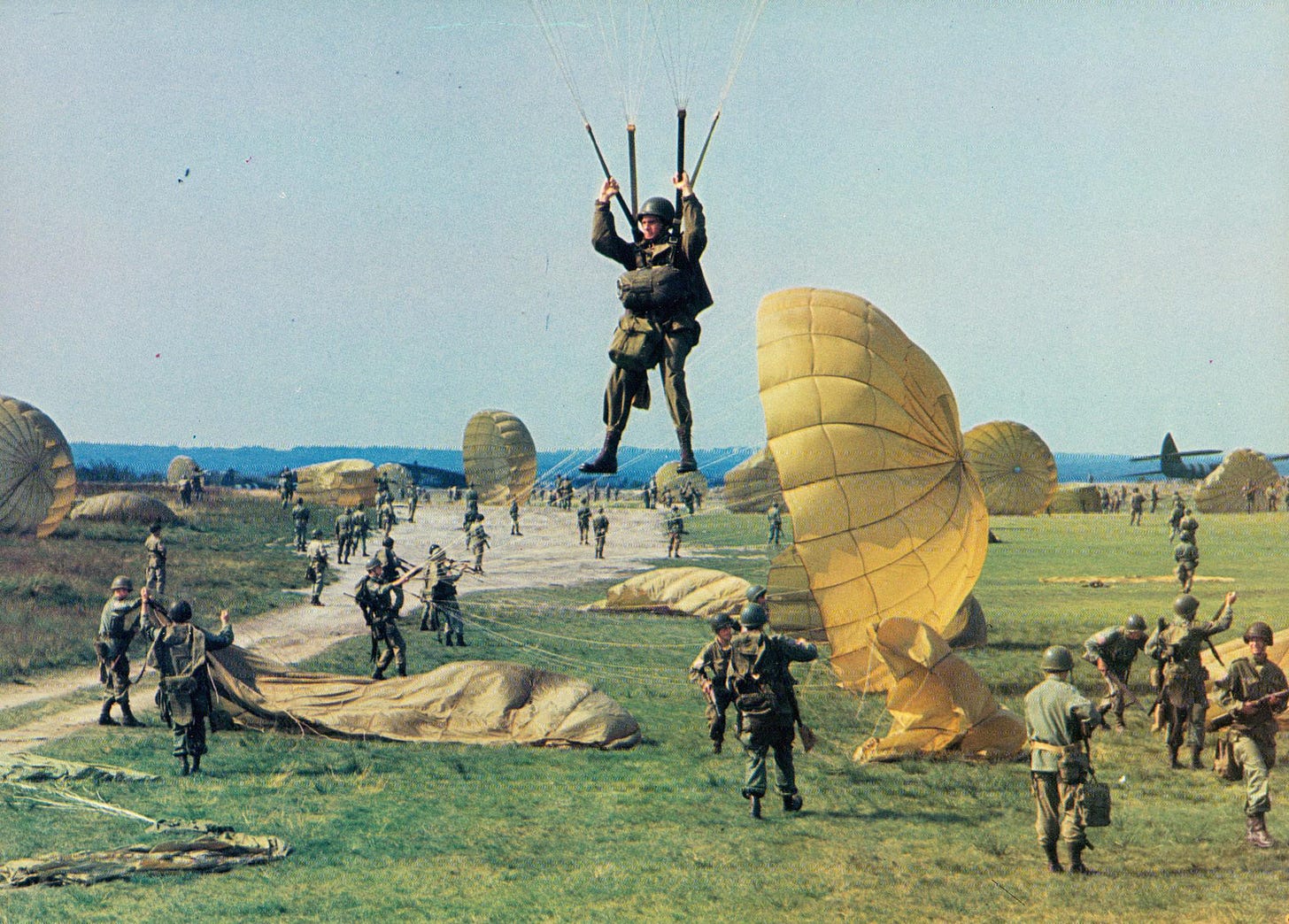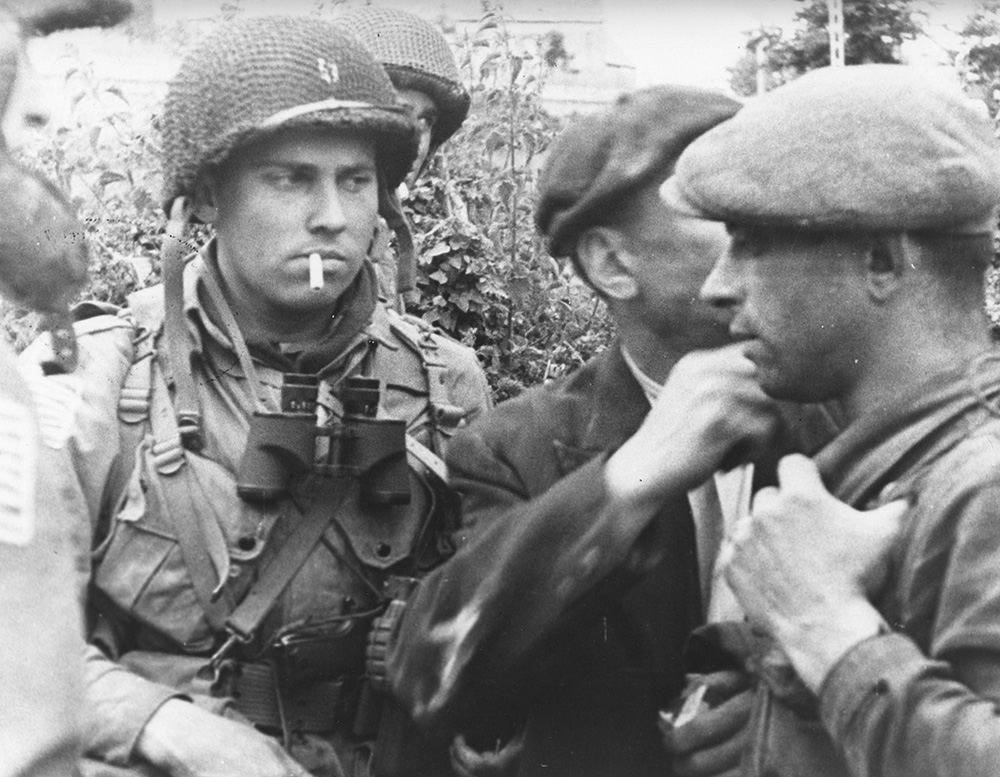A Bridge Too Far? Can The Division Survive?
A perspective for Market Garden + 81 years
Welcome to Ridgway’s Notebook, your home for airborne PME. We offer penetrating essays on military history. Through the World War II experiences of General Matthew Ridgway and the 82nd Airborne Division, we illustrate some of the similarities between the questions asked by officers of the 82nd yesterday and today—and dissect how they came to be.
There are many small military decisions which, at their end, reduce down to a captain and some men, armed with mortar parts, defending an entire regiment. What would have happened if they had been overrun?
After 76 years, the Army still didn’t know the answer to the problem. “That does become our Achilles heel,” Major General Chris Donahue said. “How do we sustain ourselves and make it so that force can survive?” It was September 17, 2020, and the commander of the 82nd Airborne Division understood invading foreign lands requires material, and delivering it is a frail thing. For the airborne division, its material falls onto a drop zone, and on September 17, 1944, it was falling near Nijmegen, Holland. On September 18, 1944, Donahue’s words would have struck the heart of Major General James Gavin, who faced an enemy shooting an arrow into his heel. To them, Donahue’s question looked a captain and some men, armed with an incomplete mortar, fighting for the existence of a regiment.
Nijmegen was nearly lost for want of a bullet.
Near Voxhil, Holland—September 17, 1944
Captain Johnson spent D-Day far from action. The companies had plundered their equipment bundles, collected parachutes for bedding or secreting—even in 1944, aerial surveillance was concerning—and pushed out to seize on surprise. The 508th Parachute Regiment dissipated: to the city, to the canal, to the woods. They were on the bleeding edge of Allied armies; some platoons crossed into Germany. And all the while, Captain Kenneth Johnson was in a field collecting things.
With only backs and feet to carry their equipment, a platoon grabbed just what was needed for the instant mission, and what would not hinder their mobility. That amounted to only a fraction of the gear in the 18 equipment bundles; the rest lay where it fell. As Assistant Supply Officer for the 508th, Captain Johnson’s six-man supply section was faced simultaneously with gathering and distributing the regiment’s supplies. While the platoons pushed out, they picked up. Picked up ammunition and wire and batteries and mines and bandages—all the arrows for an army on the move.
If they were after 60mm mortar shells, they could carry enough ammo for one target.
The task consumed Johnson’s section. As the battalions advanced, there was nobody to set forward supply points for them. So, while Captain Johnson and his men gathered, the company supply sergeants pilfered. They made multiple trips to and fro; from the DZ to collect what was needed from bundles and back again to their companies. If they were after 60mm mortar shells, they could carry enough ammo for one target. The supply sergeant made many trips and they were long trips because they were burdened and because the distances were great. For Captain Johnson, that was another problem. Due to the regiment’s thinning by disparate missions, the defenses were not mutually supportive—thousand yard gaps existed in the line—the drop zone was vulnerable, and a safe place for the stores was elusive.
The supply section worked at secreting supplies until they could see no more. They were in the hilliest part of Holland, and moving things from the drop zone to the patch of woods behind Hooge Hof farm would have been difficult. The slopes to Hooge Hof are gentle but vast. Faced with sheer expanse—views unbroken for hundreds of yards—made a man feel and look small, and it was a slow drain of the legs.
Hooge Hof was set on a cart path, and it seemed to descend gently into forever, and the sea of greens and browns rose and fell on either side like giant waves. One wave rose long and gently north, climaxing at Voxhil, a farm which presided over the drop zone. It was the hill Napoleon would have chosen to survey ranks of infantry clashing upon the fields. The 508 had a platoon there on overwatch the next morning.
Near Hooge Hof Farm—September 18, 1944
When the first shots happened, Captain Johnson and the supply section were just crawling out of their foxholes. The ground was damp, but the silk camouflaged parachutes they used to line the holes kept them dry. Shots came from the south, slowly. Johnson and all available supply personnel continued in the field collecting equipment from heavy canvas containers. There was still no one to set forward supply points for the battalions. They gathered gear under increasing danger as the day grew and small arms fire became 20mm guns raking the field. One man was killed recovering supplies. Yesterday, the gun that killed him had been captured by paratroopers. With this, recovery was abandoned and Captain Johnson focused on getting the regiment’s equipment out of danger. They took a cart and weak horse—famine conditions existed under German occupation—and loaded it as heavily as possible. From that point, things deteriorated.
The fire was now so heavy, Captain Johnson couldn’t move the wagon of supplies. They, their emaciated horse, and 1,000 pounds of military stores were withheld to a subtle fold in the earth which lowered them below the surrounding ground. And up on Voxhil, the platoon could not be reached. Sensing trouble, the company commander pulled in two squads from his southernmost platoon and led them to the dirt path on which Hooge Hof sat. As they descend the path that merged into the horizon, they were undertaken by fire from Voxhil—their own platoon wasn’t there any longer. Unable to disengage, the fight began.
From the German border to the east, Germans began attacking across the drop zone. The company commander shifted fire from Voxhil to the low ground. Sensing opportunity, the Germans on Voxhil attacked. Though there were only two squads and a dozen other troopers on this point, the existence of 2,000 men—the entire 508th Parachute Regiment—was under assault. Every bullet the regiment had in the country, and which wasn’t in the cartridge belt of a paratrooper, lay in the path of the Germans.
Every bullet the regiment had in the country, and which wasn’t in the cartridge belt of a paratrooper, lay in the path of the Germans.
Captain Johnson sprung. He and his supply section, and some D Company headquarters men, ran into a young patch of woods. The ground was soft and bouncy and gradient, and was a jungle of knee-high ferns and middling trees. At the far end, a steep knoll brought them to the edge of the wood and an ocean view of Voxhil—it was only now imperceptibly higher—and opened a perfect field of fire. And they used all the weapons and ammo from their supply dump. A 60mm mortar tube, no baseplate or bipod, slowed the attack. “The neglect of some unit in not recovering is organic mortar had helped save the day,” Johnson later wrote. All the while, he was trying to call for help.
A little before 1030, Johnson got through to an unaware Colonel Lindquist. The colonel ordered Johnson to “hold at all costs to save the vital supplies.” Lindquist’s fate hung on a dozen men and a solitary mortar tube. Five minutes later, Johnson got on the artillery net. Using a map, he identified his position and the D Company commander and his two squads down on the path. “Don’t know how effective fire will be since the enemy is so close,” he said.
After thirty minutes, eight planes appeared from the southeast. They swooped low over the ocean of green and brown and tan in several passes, cutting up and down with gunfire. The Luftwaffe had made its appearance—it was German killing German. These pilots had just strafed the 505th PIR a few miles away, but were unable to distinguish the field gray of the Wehrmacht; they were impotent to stop the invasion, but strong enough to keep Colonel Lindquist’s ammo from being overrun.
Despite this divine intervention, all of D Company was pinned down. Another hour passed—noon. The Germans were in possession of Voxhil and large swaths of the drop zone. In two hours, an air-landing was scheduled.
At 1230, over one of the field’s rises far to the north, the cavalry appeared. Since Johnson’s call to Lindquist, two companies countermarched over two hours and passed into the attack smoothly, without pause. Urgency! They fanned into football fields of space after exiting a cedar wood. And then they came over a rise. The woods blocked Johnson’s view, but all the 20mm fire from Voxhil turned. “Prodded by the leaders shouts, small groups of both companies started forward rapidly,” an observer wrote. C Company hooked south towards the path and cleared what had been Johnson’s field of fire. Johnson wasted no time. He and his supply section retrieved their emaciated horse and cart with the regiment’s ammunition and left. They traveled cross-country to the regimental CP. About halfway there, they met the 1st Battalion supply officer with a detail of 10 men headed to the drop zone to despoil any bundles they could find. But anything left on the drop zone had been damaged in the battle. Captain Johnson turned over the horse and cart—with all the regiment’s ammunition—to the 1st Battalion. When Johnson arrived at the CP, he established the supply dump. It was batteries and some signal equipment.
Operation Market Garden placed the 82nd Airborne on a strict, just-in-time diet. One missed drop—the next day’s—set them back considerably, to the point that Captain Johnson felt the supply situation was “so critical that success of the operation became marginal.” There are many small military decisions which, at their end, reduce down to a captain and some men, armed with mortar parts, defending an entire regiment. What would have happened if they had been overrun?1
***
If you are interested in a more technical study of aerial delivery problems in Operation Market Garden, click here. (I am looking at you, Mr. Iron Major.)
📚READ OF THE WEEK📚
Myrer was himself a complex person who, sometimes I’m unsure if he knew what he believed himself. The war was incredibly disorienting to him. This comes out in the inner dialogue of many of Myrer’s characters in his other books — and if you don’t read them, there’s a lot you can miss in Once an Eagle. The Big War, Eagle, and The Last Convertible are a message system.
Sources: 82nd Airborne G-2 message logs; 82nd Airborne G-3 message logs; Johnson, Kenneth L. “Supply Operations of the 508th Parachute Infantry Regiment, 82nd Airborne Division, in the invasion of Holland, Arnhem Operation, 15-19 September 1944” (Rhineland Campaign); Delamater, B.F. “Action of the 1st Battalion, 508th Parachute Infantry, 82nd Airborne Division, in the Holland Invasion, 15-24 September 1944” (Rhineland Campaign, European Theater of Operations).






Great read! don’t think the logistics part of war ever receives the credit it deserves. It’s literally the bloodlines of war. Can you imagine how those Luffwaffe pilots must have felt after strafing their own men?? You have to wonder if God’s hand was a factor.
"At 1230, over one of the field’s rises far to the north, the calvary appeared" - as so often happens, SpellCheck failed to catch the fact that "calvary" is a place while "Cavalry" is guys on horses.